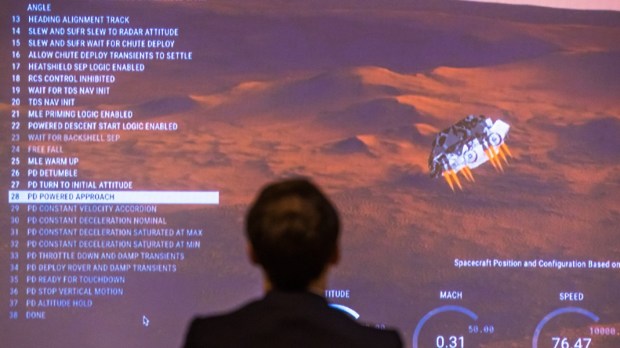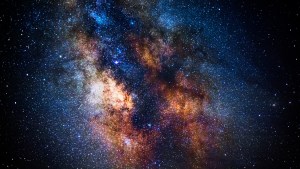On the afternoon of February 18, 2021, I was one of the many people around the world tensely watching the livestream broadcast from mission control at NASA’s Jet Propulsion Laboratory. Mankind’s latest robotic explorer was about to arrive on the planet Mars.
Several anxious minutes of updates passed as NASA received signals from the spacecraft indicating it had begun its perilous descent through the Martian atmosphere.
When final confirmation arrived that the Perseverance rover had landed safe and intact on the surface, mission control erupted in cheers.
Perseverance, or “Percy,” is similar in appearance to its celebrated predecessor Curiosity, but it carries a new array of scientific instruments to further NASA’s quest for evidence of past (or present) microbial life on the Red Planet. The robot will be exploring the landscape in and around Jezero Crater. Ages ago, this region was a vast lake fed by a nearby river. On Earth, water is necessary for life to exist and flourish, so it’s possible that the fluvial sediments of the dry river delta contain chemical traces of extinct microbes.
On April 19, after some initial software hiccups, Percy launched a tiny companion, a four-pound helicopter named Ingenuity.
Ingenuity accomplished the first-ever flight of a powered aircraft on another planet. Its success could pave the way for future “Marscopters” that would greatly enhance NASA’s ability to make detailed surveys of Martian terrain.
Captivated
For millennia, humankind has been captivated by the night sky and has speculated on the nature of the cosmos. From those early days of astronomy until the present, our neighboring planet Mars has seemed to hold a particular fascination for us. Countless science fiction novels have been written about the possibilities of alien life forms and civilizations inhabiting the Red Planet.
The dawn of the Space Age and decades of robotic probe missions have dispelled some of the mystery around Mars, and yet our intense interest endures.
Despite appearing to be a “dead” world, the geologic evidence indicates that Mars once possessed abundant liquid water on its surface. This leaves open the tantalizing possibility that life once existed there.
As I, along with the rest of the world, celebrated the beginning of Percy’s important work on Mars, I found myself asking an intriguing question: Why are we as a species so enthralled with the exploration of space and the search for extraterrestrial life?
Humans seem to be born explorers. Even in the deeps of prehistory, our ancestors were pushing the boundaries of what was known, inventing new technologies and pioneering new frontiers.
It has been speculated by some scientists that there could be a genetic basis for human wanderlust, a so-called “explorer gene.” This is an oversimplification, of course, as no single gene could form the basis of such a complex behavior. Even if we are somehow “wired” to explore, I find this materialistic, determinist explanation hollow and unsatisfying. I think we need to dig deeper to find a more complete answer to this question.
Deeper restlessness
Spiritual thinkers and theologians have known for centuries that there is a profound and abiding restlessness in the human soul, a longing for communion with the infinite.
Perhaps the most famous summation of this insight comes from St. Augustine of Hippo at the beginning of his Confessions, where he addresses God, saying,
You stir man to take pleasure in praising you, because you have made us for yourself, and our heart is restless until it rests in you.”
Is it possible that the scientific quest to explore the cosmos is an expression of the universal human longing for the transcendent?
In his celebrated book Mere Christianity, C.S. Lewis writes,
If I find in myself a desire which no experience in this world can satisfy, the most probable explanation is that I was made for another world.
Earth is not our true homeland, our patria as the Romans would call it. But Lewis also understood that this patria, the place where our souls will at last find rest, will not be found on Mars or on any world within the bounds of the contingent, created universe.
Lewis continues,
I must keep alive in myself the desire for my true country, which I shall not find till death … I must make it the main object of life to press on to that country and to help others to do the same.
We are pilgrims in this world, pressing onward to the true “final frontier,” the Beatific Vision of God our Creator when, as 1 John 3:2 puts it, “we shall see him as he is” and finally find the home we have been searching for.



